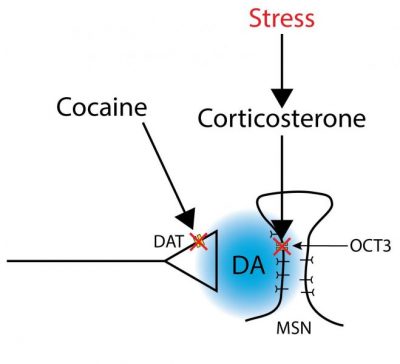Project Background
This project examines the cellular mechanisms by which stressful life events, through elevations of the glucocorticoid hormone corticosterone, contribute to increases in the risk of relapse in cocaine addiction. We have demonstrated that corticosterone acts directly in the nucleus accumbens to potentiate the effects of low-dose cocaine on extracellular dopamine concentrations and on reinstatement of extinguished cocaine-seeking behavior. In subsequent studies we demonstrated that stress level corticosterone alone decreases dopamine clearance in the nucleus accumbens and potentiates low-dose cocaine-induced decreases in dopamine clearance in the nucleus accumbens. Studies in mice genetically modified to lack OCT3 expression demonstrated that corticosterone-induced potentiation of low-dose cocaine-primed reinstatement of drug seeking behavior requires expression of OCT3. Together these studies indicate that dopamine clearance in the nucleus accumbens is mediated by both DAT- and OCT3-mediated transport, and that inhibition of OCT3-mediated dopamine clearance contributes to the acute behavioral actions of corticosteroid hormones.
Relevant Lab Publications
Graf EN, Wheeler RA, Baker DA, Ebben AL, Hill JE, McReynolds JR, Robble MA, Vranjkovic O, Wheeler DS, Mantsch JR, Gasser PJ. (2013) Corticosterone acts in the nucleus accumbens to enhance dopamine signaling and promote cocaine use. J. Neurosci. 33: 11800-11810. PMCID: PMC3713722
McReynolds JR, Taylor A, Ambrosius T, Derricks O, Vranjkovic O, Nino B, Kurtoglu B, Baker DA, Wheeler RA, Gasser PJ, Mantsch JR. (2017) Corticosterone potentiation of cocaine-induced reinstatement of conditioned place preference in mice is mediated by blockade of organic cation transporter 3. Neuropsychopharm. 42(3):757-765. PMCID: PMC5240184
Wheeler DS, Ebben AL, Kurtoglu B, Lovell ME, Bohn AT, Jasek IA, Baker DA, Mantsch JR, Gasser PJ, Wheeler RA. (2017) Corticosterone regulates both naturally occurring and cocaine-induced dopamine signaling by selectively decreasing dopamine uptake. Eur. J. Neurosci. 46: 2638-2646. PMCID: PMC5704943.
